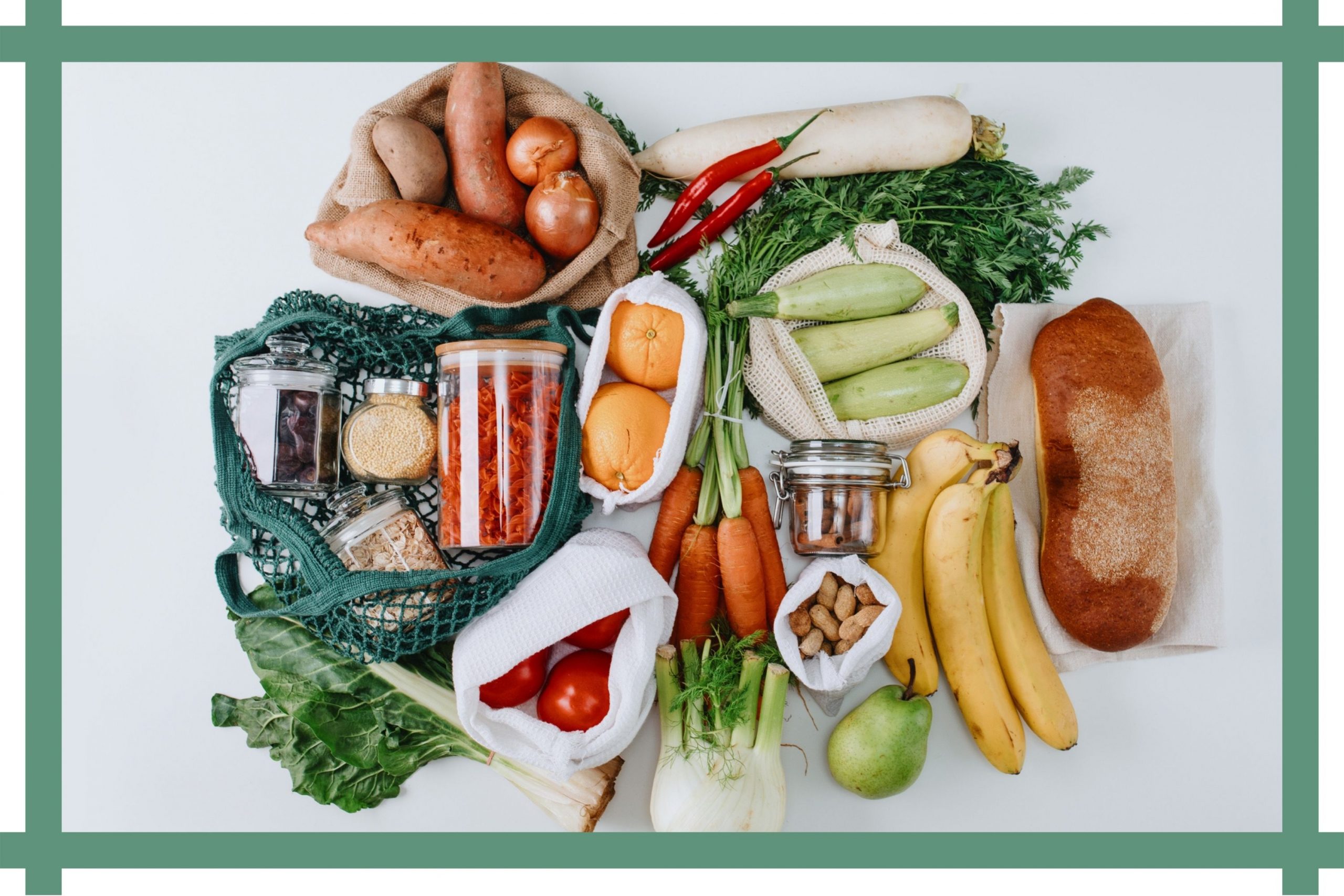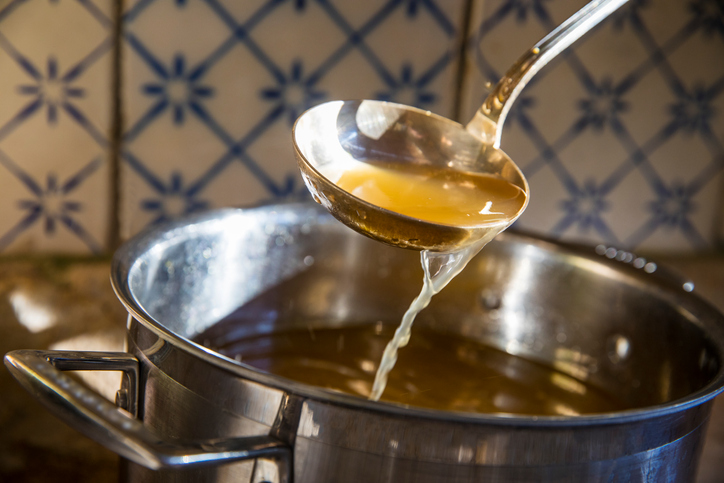How to reduce food waste: 17 efficient ways to save money


We've rounded up the most efficient ways to reduce your food waste this year. Try these simple tricks to reduce food waste to help save money and of course, the planet.
In the UK, we throw away 6.6 million tonnes of household food waste a year, almost three-quarters of which we could have eaten. And 1.3 billion tonnes are chucked away globally, which makes for one-third of all food produced for human consumption, according to the Food and Agriculture Organisation of the UN. Now that we are suffering a cost of living crisis with energy and food bills rocketing, we need to do everything we can to cut down spending – while doing our bit to help the environment too.
And the fact is, it's actually pretty easy to save money on food and reduce the amount we throw away. Reducing your food waste can save the average family of four up to £730 per year according to WRAP, a charity working with governments, businesses, and citizens to create a world in which resources are used sustainably. "We don't waste anything at all which also reduces plastic waste," says Imogen Tinkler of seasonal food brand Bangers and Balls. "We even ate our Christmas Tree - we used it to cure some fish. Though don't do this if you have a yew tree!".
"We use veg scraps to make stock, and dehydrate leftover fruits - we all have a child who eats half an apple - so you can make it into a powder and sprinkle over food to add flavour. We use bread that is about to go stale to whiz up and have as breadcrumbs or use it to make a bread and butter pudding. You can even make cheap Parmesan – so tasty," Imogen says. "We also find ingredients like rosemary, as well as wild garlic for pesto – they grow in so many places. And if we have a roast chicken dinner, the carcass gets boiled for stock and the leftovers go into a curry to use the next day. We often make three dinners from it."
How to reduce food waste
1. Make your own sauces
Making sauce from scratch will give you a decent saving – a jar of Dolmio sauce costs £1.25 in Sainsbury’s whereas you can grab yourself a tin of chopped tomatoes for a mere 35p. Just add a clove of garlic, some chopped onion, and a sprinkle of dried herbs, and you’ve got a simple homemade sauce for around half the price - plus, you know exactly what’s in it – and that is no added sugar, fat or preservatives.
It's not only basil that works in pesto – you can whip up a version of this tasty Genovese sauce from any leftover greens. Rocket or spinach that’s been left a little long and is starting to wilt? Into the food processor. Herb stalks? In they go. Beet and carrot top greens? Bosh. Adapt the perfect homemade pesto and you'll have an easy sauce for a quick weeknight dinner stirred through your favourite pasta.
2. Prepare ahead using meal plans and shopping lists
"I always plan my meals to avoid waste, we use everything we buy and we know what will be used on what date," says Maddy Alexander-Grout.
Parenting advice, hot topics, best buys and family finance tips delivered straight to your inbox.
Maddy runs a money-saving app called My VIP Rewards that helps people save money on food shopping - so she certainly knows a thing or two about saving money.
Make a note of what you will cook for dinner each night of the week (this planning will help you make sure that you're eating a good variety of foods with different nutrients as well) and all the key ingredients. Also make a list of everything you need for breakfasts, packed lunches etc. Only buy things you know you definitely need, especially when it comes to perishables. Being organised when you go to the supermarket will save you a significant amount off the bill (oh and don't go when you're hungry because we all know what happens then...)
3. Use up what you've already got
What are undoubtedly the two most common purchases – bread and milk – are also those that we waste the most. Over 240 million slices of bread are thrown away each year according to Love Food Hate Waste, which is madness when you think it can easily be used for toast, popped in the freezer, or made into breadcrumbs for cooking. And almost six million glasses of milk get poured down the sink when they could easily be used for milkshakes, smoothies, or a nice bechamel sauce.
Before you go shopping, always do a recce of the fridge and freezer to see what you've already got that can be used up. If you're not feeling particularly inspired, try researching recipes. Include the things you've already got in the fridge that may not be looking healthy for too much longer.
Got some eggs and some veg? Whip up a nice frittata. A glut of tomatoes and courgettes? How about a ratatouille? Only shop for extras to accompany what you already have at home. And always check your herbs and spices so you don't end up buying your fourth jar of oregano or cumin (we've all done it). A nifty tip to reduce food waste.
4. Buy fruit and veg in season
Eating seasonally is not only environmentally more sound, but it's also cheaper to the consumer when you don't have to add the cost of all that traveling. A strawberry that was still very recently sitting in a farmer's field is going to be fresher and more flavoursome than one that's clocked up the air miles flying halfway across the world.
Buy from farmer's markets and go to pick-your-own (doubling up as a day out!) if you can, and check for the country's source on supermarket packaging. Educate yourself on what grows when and, as much as you might love a nice slice of melon, it makes no sense to buy one in January, nor should you buy sprouts in the summer if you're hankering after a roast. Find out more about what is in season each month with our seasonal food calendar.
When a fresh product is plentiful, it drives the prices down – so when there was a recent spell of cool weather and intense rainfall in Spain, the strawberry crops were affected and the prices on our shelves here rose by 60% because of a lack of supply. Food is also cheaper in season because it will have been grown in cheaper conditions – as nature intended, basically.
5. Make the most of your freezer
A Manchester Metropolitan University study, commissioned by Iceland, showed that families can reduce their waste by 47% by eating frozen food, and showed that 90% of people thought buying frozen food was better value than fresh.
"You may be surprised to know that pretty much everything can be frozen," says mother-of-two Jenna Brown, the Food Safety Mum.
"The list of what not to freeze – like cucumbers, mayonnaise, and lettuce, is much shorter than what you can freeze! Remember the freezer just acts as a "pause" button on food. And don’t be put off freezing your raw meat – you can still freeze leftovers of a cooked meal that used previously frozen raw meat!"

6. Use up leftovers
Each year, the average family throws away £700 worth of surplus food, according to WRAP.
A rich, saucy beef casserole or stew is the perfect dish for using up any veg left in the fridge at the end of the week. Wilted greens, celery ends, that left-over half a pepper. Toss them all into a heavy-bottomed pan along with any beans you have in the pantry, a can or two of chopped tomatoes, and some stock. Add a handful of grains or pulses for a bit of bulk. Lovely with or without the addition of some meat.
7. Infuse your grains
Left with herb stems once you’ve used the leaves? Don't bin them, add them to the pot when simmering up your grains. They bring a great hint of flavour to your carb of choice, whether that be quinoa, rice, or couscous, once cooked. Served with a tasty curry or a tagine made from all those leftover veggies lurking in the fridge, this is a thrifty winner.
8. Only buy what you need
"I shop twice a week for yellow stickers to avoid food waste, I go later in the evening and pick up something I can use for dinner that night," says Maddy Alexander-Grout.
She also avoids doing a supermarket delivery, where you don't get to choose your own products. "I don’t shop online, I feel that you can’t choose your fruit and veg which makes it last for less time." It also avoids that pitfall we've all been victims of, where we think we've ordered five bananas and it turns out we've actually ordered five kilos of bananas. A great one to make sure you reduce food waste - and save money.
9. Try growing fruit and veg at home
Growing your own could save you a significant amount on your shopping bill every year. The experts at Garden Buildings Direct showed that planting veggies from one packet of seeds can save an average of £149 per year. They found that sprouts, aubergines, and courgettes were among the most cost-effective veggies to grow – just one courgette plant can produce 64 courgettes every year.
Growing your own will make you feel satisfied (and perhaps even a little smug), will get you out in the garden for a vitamin D hit and fresh air, give you a mental health boost, and have you eating seasonally and organically, and save you money on the weekly shop.
If you're something of an amateur, opt for easy-to-grow veggies like courgettes, beetroot, and radishes (particularly good if you're an impatient gardener, as they only take about four weeks to be ready). Fruit-wise, strawberries are easy in the early summer, and, for flavour, chillies are a dream to grow. If you don't have outside space, try a herb garden on your windowsill. Rosemary and thyme are both hardy, and basil will grow for fun.

10. Make your own stock
Instead of throwing all the organic waste into the compost bin, pop it into a container in the freezer instead. Root veg peelings, carrot tops, even onion skins, mushroom stalks, and herb stems. At the end of the week, empty everything into a heavy-bottomed pan, season with salt, cover with plenty of water and add a bay leaf or two and some turmeric. Then simply bring to the boil, reduce the heat, cover and simmer for a couple of hours. A nifty way to reduce food waste.
11. Use every part of the vegetable - where possible
Did you know that you can eat the whole of some vegetables? For example, when roasted, cauliflower leaves crisp up nicely. With a dash of your favourite spices, work great as your side of greens with dinner. They can also be steamed or chopped and tossed into a stir fry with some garlic, and perhaps a chilli if you like a bit of fire. They're also a good source of vitamin C, fiber, and calcium, so you'll be getting some extra nutrients from your leftovers.
Broccoli is not just good for its florets, you can actually make use of the whole head. Hold onto those stalks and boil up with some root veg and stock for a quick, tasty, and filling creamy, green superfood soup. Got some cheese that needs eating as well? Treat yourself to a classic Stilton and broccoli soup, for example, perfect for a midweek supper or a comforting lunch.
Take the peelings from any root veg and you can create a quick and easy, more-ish snack. To make potato peel crisps, give your peelings a good rinse and pat them dry, pop into a roasting tray with a good drizzle of oil, salt, and maybe some smoky paprika or cumin. Roast in the oven until deep golden brown and crispy, then tip directly into a serving bowl. Most delicious eaten warm, ideally with a glass of something cold and fizzy.
12. Make your own vinaigrette and dressings
Making your own salad dressing will save you ££s on the shop-bought stuff. Were you to peruse the shelves in Sainsbury’s, a bottle of Mary Berry’s Classic Salad Dressing would set you back £4. Instead, mix some olive oil, vinegar, salt and pepper, and a few herbs will cost you next to nothing.
When you’re scraping the bottom of any food jar, you know that you’ll never quite be able to get everything out. By adding some oil, vinegar, and a bit of seasoning you can shake it all up into a delicious vinaigrette for your salads. Tahini? Add olive oil, chopped garlic, lemon zest and juice, salt and pepper, and a dash of sumac. Mustard? Olive oil, red wine or apple cider vinegar, honey, and seasoning. Jams and preserves? Olive oil, balsamic vinegar, shallots, and fresh thyme work great.

13. Make fruit-infused water
This is such a simple way to make use of strawberry tops, orange or lemon peel, and ginger scraps. Simply add to your water and leave it in the fridge to infuse overnight. The next day you’ll have refreshing, flavour-filled water. Try experimenting with flavour combinations too, maybe adding some herb stalks for a twist. It’ll taste great, and ensure you’re nicely hydrated.
Strawberries are one of the top 10 most thrown away fresh foods in the UK, according to research by Tesco, so if they’re slightly past their best, add them to your drinks for flavour.
14. Use every part of the fruit - where possible
It turns out you can eat the entire banana, skin and all. Just wait for your bananas to ripen well the skin will be thin and sweet. Simply give them a good wash and add them to your morning smoothie for some extra fiber. They also make a great chutney ingredient.
Never throw out peelings from oranges, lemons, and grapefruits either. Boiled up with sugar and water, you can make candied peel or a citrus-infused syrup for baking. Top up with boiling water or dry them out to use at a later date for a fragrant tea. They can also be used for baking. Add them to lemon muffins or to a fruit cake, and leave the rest in a container in your baking cupboard for next time.
15. Use more pricey ingredients sparingly
A little goes a long way, as they say. That's why truffles get shaved on pasta... Expensive foods are often the most flavoursome, so they can be used minimally and still lack a punch. Use half the meat in a casserole or pasta sauce, and bulk out with beans or lentils for the same protein hit. Add a few slices of smoked salmon to your eggs or to a bagel with cream cheese, and keep the rest for another day. Make a seafood pasta and add more inexpensive fish like mussels in with your fancy prawns.
16. Infuse your own ginger tea
Next time you use ginger in a stir fry or curry, or after a baking session, add the peelings and ends to a mug of hot water. Leave to brew for five minutes for a steaming ginger tea. Super tasty, cleansing, and also a great aid for digestion. This is a great alternative if you're trying to cut down on the old caffeine, too. You'll feel ever so virtuous. Oh, and you can also do this with mint.
17. Prioritise food according to use by date
While the ‘use by’ date needs to be abided by, as it’s about food safety, understanding labeling will save you money too. If your label says ‘best before’ that is purely advisory, and that same label contributes massively to food waste - for example, we throw away 720 million eggs a year thanks to their ‘best before’ label, according to research by Too Good To Go – when they were perfectly fine to eat
"First in, first out. It sounds simple enough but make sure you put new foods at the back. This means that using older products first will come naturally," says food safety expert Jenna Brown.
So a bit like stock rotation at a supermarket but in your own house. Also, remember that 'use by' and 'best before' are two very different things. "Put simply, use-by dates are there for your safety and mustn’t be ignored whereas best before dates are just for quality – so best before dates CAN be ignored if it looks and smells fine and there is no mold present," says Jenna. A great way to reduce food waste.
Video of the week:

Lara Kilner is a writer and editor with two decades of experience in national newspapers, magazines, and websites. She writes about food, lifestyle, travel, health and wellness, and entertainment, and regularly interviews celebrities and people with interesting life stories and experiences. Her foodie content has included interviews with Jamie Oliver, Rick Stein, Queer Eye’s food expert Antoni Porowski, the Hairy Bikers, Hugh Fearnley Whittingstall, Raymond Blanc, Andi Oliver, Paul Hollywood, Prue Leith, and Nadiya Hussain.